|
|
|
Sort Order |
|
|
|
Items / Page
|
|
|
|
|
|
|
| Srl | Item |
| 1 |
ID:
171074
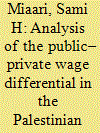

|
|
|
|
|
| Summary/Abstract |
This paper measures and analyzes the dynamics of the public–private wage differential in the West Bank and Gaza for the period before and during the ‘second Intifada’ using data from the Palestinian Labour Force Survey (PLFS) of the Palestinian Central Bureau of Statistics (PCBS). Because the distribution of workers’ individual characteristics, such as skills, and the ‘returns’ to these characteristics may differ across workers, the wage differential is decomposed into two components: an ‘endowment’ effect and a ‘returns’ effect. The results show that in the pre-Intifada period, the wage gap between the public and private sectors narrowed in both the West Bank and Gaza. However, a sharp increase is seen after the outbreak of the Intifada. Moreover, most of this increase comes from an increase in ‘returns’ to skills composition in the public sector, (unexplained effect), rather than a change in the skills composition of public sector workers, (explained effect). Using recent econometric quantile regression techniques, the analysis of the public–private sector wage gap from 1998 to 2006, at various points along the wage distribution, shows that the wage premium, (penalty), for the public sector varies across the distribution, being higher, (lower), at the lowest end of the wage distribution and decreasing (increasing) along the wage distribution; it becomes negative in the top percentiles.
|
|
|
|
|
|
|
|
|
|
|
|
|
|
|
|
| 2 |
ID:
187207
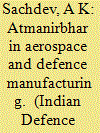

|
|
|
| 3 |
ID:
123775
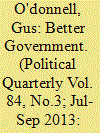

|
|
|
|
|
| Publication |
2013.
|
| Summary/Abstract |
The decline in future trend economic growth coupled with the ever increasing demands of an ageing population mean the public sector will need to deliver better for less. This will require a smarter bureaucracy using the latest behavioural advances and using wellbeing as a measure of success. Spending will need to be directed more to prevention rather than cure. Radical tax and benefit reform is needed to make work pay and offset the rise in inequality.
Decision making could be improved by attracting more diverse, experienced people into politics by, for example, more use of open primaries, a level playing field for independent candidates and better training. Ministers could be set proper objectives and have constructive appraisals.
A proposed Office of Taxpayer Responsibility could screen policies to avoid the worst ones, backed by no evidence, from being introduced as it is very hard to abolish bad policies.
|
|
|
|
|
|
|
|
|
|
|
|
|
|
|
|
| 4 |
ID:
131232
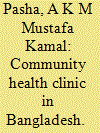

|
|
|
| 5 |
ID:
162949
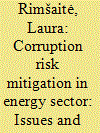

|
|
|
|
|
| Summary/Abstract |
Background of the research is that corruption issues arising in the energy sector strongly depends on the location of the resources as well as the monopolistic nature of the undertakings or political decisions. The participation at the public procurement tenders result the information exchange between the competitors therefore lead to the market closure and increased prices for the end-users. Enforcement of anti-corruption laws have risen, including the imposition of huge fines for the enterprises, and prison sentences for offending corporate executives. The purpose of this article is to analyse and evaluate the factors resulting corruption actions in the energy sector and to reveal the intercourse between the competition law regulation and corruption regulation. The data collection, systemic review and other methods were used. Key findings reveal that corruption occurs due to the specifics of the sector as the resource location, politics, and public procurement. Significance of this research is high due to increased impact of the energy resources to daily life and the monopolistic undertakings resulting high prices to the consumers. Recommendations to minimise the corruption probability highlights the importance of the increased level of transparency and prevention mechanisms especially in the vulnerable areas.
|
|
|
|
|
|
|
|
|
|
|
|
|
|
|
|
| 6 |
ID:
104957
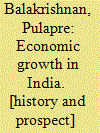

|
|
|
|
|
| Publication |
New Delhi, Oxford University Press, 2010.
|
| Description |
xxv, 289p.
|
| Standard Number |
9780198065470, hbk
|
|
|
|
|
|
|
|
|
|
|
|
Copies: C:1/I:0,R:0,Q:0
Circulation
| Accession# | Call# | Current Location | Status | Policy | Location |
| 056092 | 330.954/BAL 056092 | Main | On Shelf | General | |
|
|
|
|
| 7 |
ID:
144743


|
|
|
|
|
| Summary/Abstract |
The UK's changing political and legal landscape since 2000 reflecting transformations in wider society have elevated equality and diversity (E&D) issues to prominence in the public sector, including in the British armed forces. This research highlights key developments in the British military in relation to E&D, focusing both on areas of progress, and on the challenges still confronting the Forces. The findings reveal that the Forces have made significant strides in advancing E&D through the implementation of a range of policy initiatives but the persistence of discrimination, developments in the wider environment and the dilemmas raised by the strands of age and disability pose challenges. The value of this research is to increase our understanding of diversity management in a public sector institution that has been under-researched and views itself as “different,” and will be of interest to policymakers, E&D practitioners and academics in the field.
|
|
|
|
|
|
|
|
|
|
|
|
|
|
|
|
| 8 |
ID:
112078
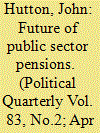

|
|
|
|
|
| Publication |
2012.
|
| Summary/Abstract |
The dramatic rise in life expectancy and longer retirement has created serious concerns about the long-term affordability of public sector pensions. Drawing on insights from a recent inquiry into public sector pension reform, commissioned by the Conservative-Liberal Democrat Coalition and led by the author, this article outlines the challenge faced by policy makers and sets out how it should be addressed. It argues that, with 12 million people active in this part of the pensions system, and estimates that the gap between contributions and payments will grow from £3bn to £10bn in the next decade, the government has no choice but to enter the 'lions' den' of pensions' policy. It contends that any long-term solution is to be crafted cannot be based solely on economics, but must also answer fundamental questions of ethics and equity.
|
|
|
|
|
|
|
|
|
|
|
|
|
|
|
|
| 9 |
ID:
105221
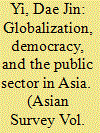

|
|
|
|
|
| Publication |
2011.
|
| Summary/Abstract |
In this era of globalization, does democracy in Asia have a mediating impact on a country's public sector? As the first empirical analysis focused solely on Asian countries, this paper finds that, in general, democracies are associated with a larger government. In particular, democracies more exposed to the global trade have larger public economies. This is not the case, however, in democracies more dependent on foreign direct investment.
|
|
|
|
|
|
|
|
|
|
|
|
|
|
|
|
| 10 |
ID:
168742
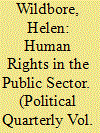

|
|
|
|
|
| Summary/Abstract |
This article examines how universal human rights have been given practical effect in the UK through the Human Rights Act. It focusses on the role of human rights in public services and using the duty placed on public officials as a lever to bring about positive change.
|
|
|
|
|
|
|
|
|
|
|
|
|
|
|
|
| 11 |
ID:
096937


|
|
|
| 12 |
ID:
093699
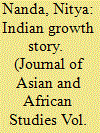

|
|
|
|
|
| Publication |
2009.
|
| Summary/Abstract |
India embarked on a high growth path right in the early 1950s. However, due to some internal and external shocks, the economy slowed down from the mid-1960s until about 1980. Moreover, throughout the period, industry and services grew at higher rates compared to agriculture whose share in GDP was almost 60 per cent in 1950. Thus, the increasing trend in the overall growth rate is the reflection of the increasing shares of the high growing sectors in the GDP. It is also suggested that mere growth is not sufficient to reduce poverty, while poverty reduction may also impact growth positively.
|
|
|
|
|
|
|
|
|
|
|
|
|
|
|
|
| 13 |
ID:
089622


|
|
|
|
|
| Publication |
2009.
|
| Summary/Abstract |
There is a public interest in ensuring that infrastructure systems are appropriately protected and prepared for disruptions. While infrastructure protection is usually viewed as a public responsibility, infrastructure risk management actually requires a high degree of cooperation between the public and private sectors, particularly in the sharing of information about risks to infrastructure. Discussions with Chief Security Officers across sectors of the US economy reveal the complexity of the task, as they describe at length the private sector's requirements of multiples types of information about a range of potential threats. While the US government has established many mechanisms for sharing information, barriers remain that inhibit both the private and public partners from obtaining the information needed to protect infrastructure. Overcoming these barriers requires new thinking about the intelligence generation process, the mechanisms and practices upon which the process relies, and the responsibilities of those in the private sector who participate in it.
|
|
|
|
|
|
|
|
|
|
|
|
|
|
|
|
| 14 |
ID:
185265
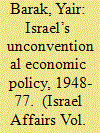

|
|
|
|
|
| Summary/Abstract |
Since its establishment in 1948, Israel’s economic policy has been original and unique, since it was loath to accept imported foreign economic ideas, and at times even explicitly rejected them. When such ideas were partly accepted, they were adjusted to local circumstances – economic, social or political – as understood by the political leadership. This unconventional economic policy was successful – not only by conventional economic standards but also when considering the massive socioeconomic challenges confronted by Israel during its first thirty years of statehood.
|
|
|
|
|
|
|
|
|
|
|
|
|
|
|
|
| 15 |
ID:
128171
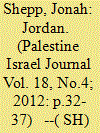

|
|
|
|
|
| Publication |
2012.
|
| Summary/Abstract |
For all their potential and the lip service paid them as a majority group, Jordanian youth today are not being heard and see a system stacked against them.
|
|
|
|
|
|
|
|
|
|
|
|
|
|
|
|
| 16 |
ID:
087498
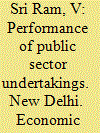

|
|
|
|
|
| Publication |
New Delhi, Economic and Scientific Research Foundation,
|
| Description |
193p.
|
|
|
|
|
|
|
|
|
|
|
|
Copies: C:1/I:0,R:0,Q:0
Circulation
| Accession# | Call# | Current Location | Status | Policy | Location |
| 016088 | 338.62/SRI 016088 | Main | On Shelf | General | |
|
|
|
|
| 17 |
ID:
097711
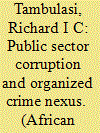

|
|
|
|
|
| Publication |
2009.
|
| Summary/Abstract |
The nexus between corruption and organised crime is under-established. This article argues, however, that there is a direct linkage between corruption and organised crime. By using the case study of a Malawi fertiliser subsidy programme the article shows that corruption not only gives rise to organised criminal groups, but also works as a lubricant for the effective operation and survival of organised criminal groups.
|
|
|
|
|
|
|
|
|
|
|
|
|
|
|
|
| 18 |
ID:
152352
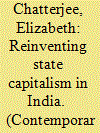

|
|
|
|
|
| Summary/Abstract |
Despite three decades of liberalization, the public sector’s contribution to the Indian economy remains crucial but underappreciated. Particularly striking is the resilience of central public sector enterprises. The best of these have been reinvented: retrofitted for the market era, exposed to competition and endowed with at least the trappings of corporate governance. Elsewhere in the world, such state-market hybrids have been seen as characteristic of a powerful new model: ‘state capitalism 2.0’. How, then, do these reinvented central enterprises fit within India’s contemporary liberalization process? From the vantage point of the energy sector, in which India’s largest state-owned enterprises (SOEs) predominantly lie, this article seeks to shed light on key continuities and changes in India’s underlying regime of state capitalism. It argues that the most successful central SOEs institutionalize a pragmatic variant of liberalization, in which public versus private ownership matters less than ideas of managerial efficiency and market discipline. Yet this does not amount to a coherent alternative to deregulation or first-generation state capitalism. Instead these enterprises are treated with an admixture of neglect and short-term exploitation, milked for resources to fund a wide system of subsidies. India’s second-generation state capitalism is distinguished from its older incarnation less by the declining role of the state than by the increasingly pro-business nature of these transfers.
|
|
|
|
|
|
|
|
|
|
|
|
|
|
|
|
| 19 |
ID:
114395
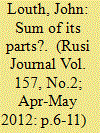

|
|
|
|
|
| Publication |
2012.
|
| Summary/Abstract |
'Partnership' and 'partnering' are concepts commonly applied to new initiatives between government and industry. But, as the state looks to improve delivery and value for money in procurement programmes, a simple label will not suffice. Partnership and partnering must truly reflect a collaborative set of working practices bridging the private and public sectors.
|
|
|
|
|
|
|
|
|
|
|
|
|
|
|
|
| 20 |
ID:
096664
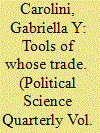

|
|
|
|
|
| Publication |
2010.
|
| Summary/Abstract |
As the adoption and harmonisation of international public sector accounting standards and guidelines strengthen, decision-making processes and definitions assumed in establishing accounting best practices become more critical objects of study. Especially for countries in the global South that are making efforts to converge with such international guidelines, a review is warranted of the creation of the UN's System of National Accounts (guiding the derivation of GDP, for example) and the International Federation of Accountants' public sector accounting standards. This paper endeavours to undertake such a review, concluding that, as currently designed and articulated, public sector accounting guidelines fail to adequately encompass and address the voices and concerns of governments in the global South.
|
|
|
|
|
|
|
|
|
|
|
|
|
|
|
|
|
|
|
|
|